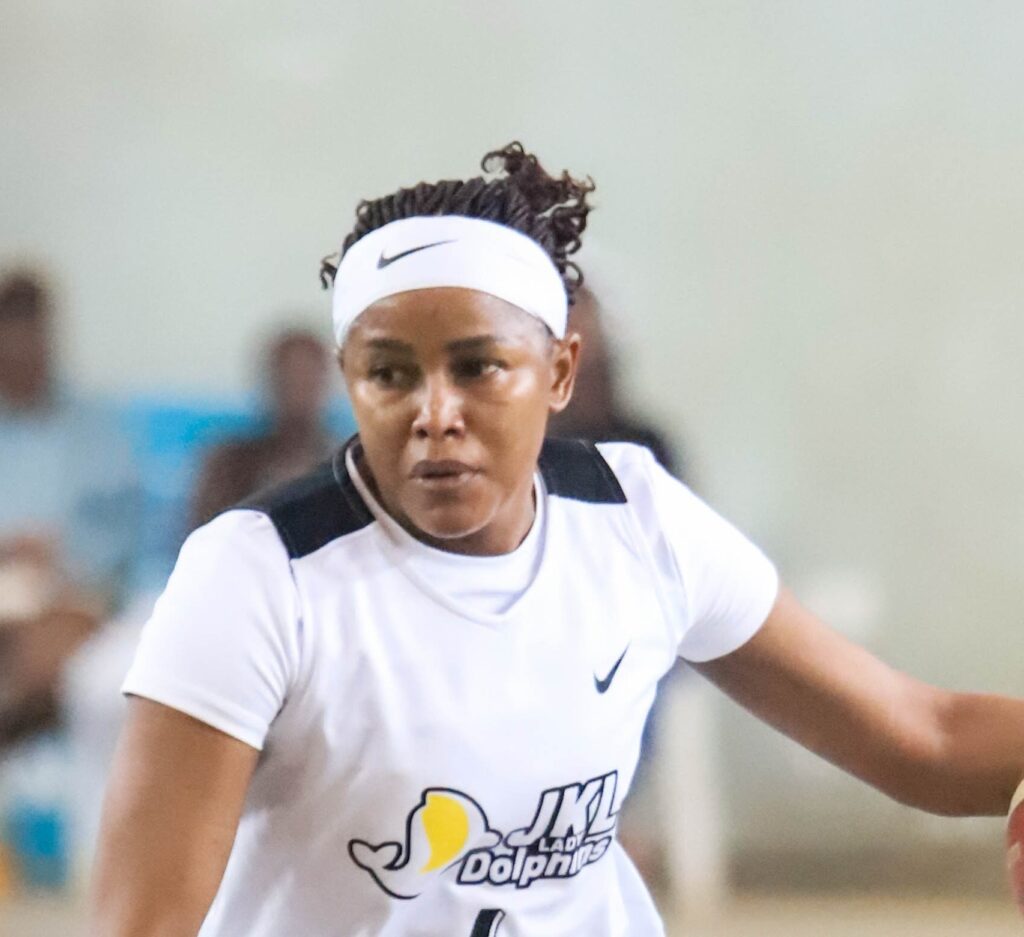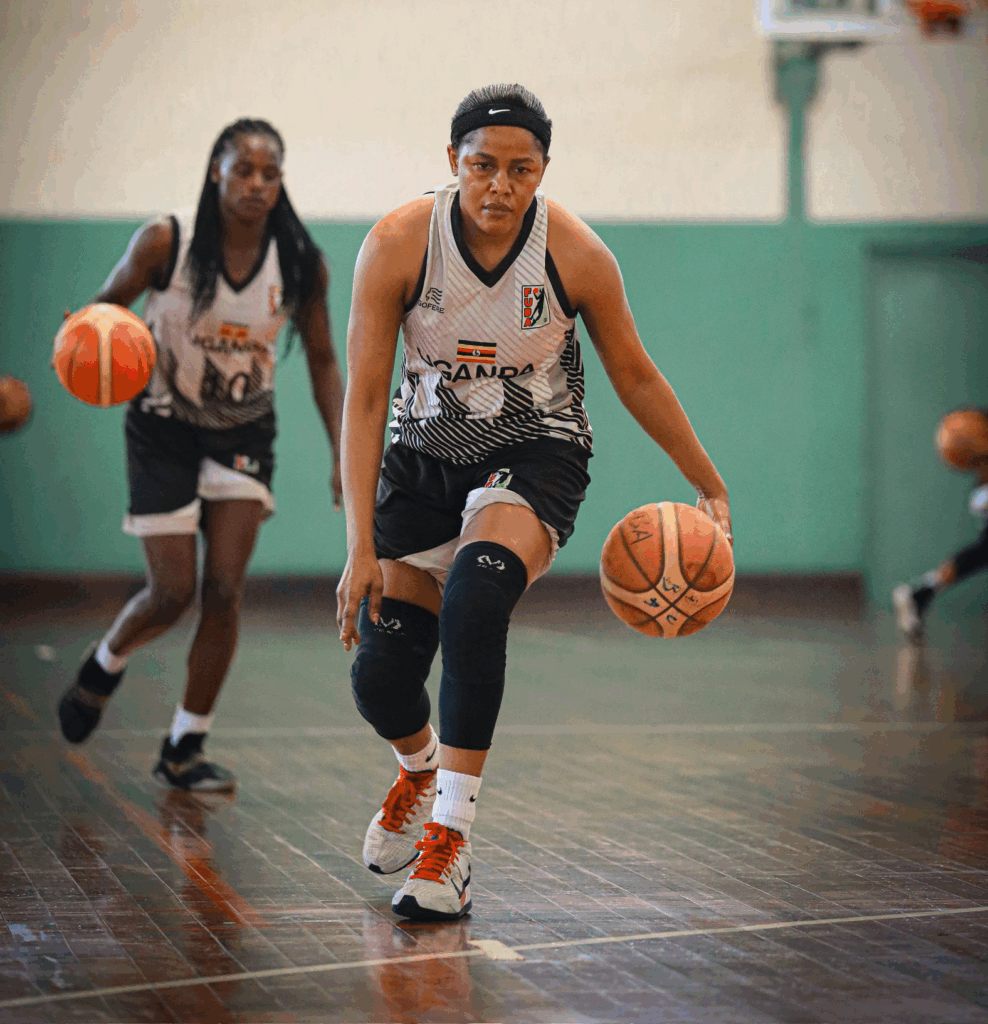Earlier this year, on his podcast The Game of Life, Andrew Mwanguhya hosted Flavia Oketcho, the woman who started the idea of UCU canons, has won tens of championships, led basketball teams and continues to pour much into the game. Gift Kalukali retells the interview in this edited and abridged version.
Today, I’m honored to host a woman who has defined Ugandan basketball for over two decades. She’s played at the very highest level, captained the national team and led different clubs to glory. Welcome, the incomparable Flavia ‘Flirsh’ Oketcho.
I’m honoured. Hi Andrew.
Basketball player, brand ambassador, entrepreneur, mom, wife—we can say it all. You have won 14–15 national championships and captained the national team. Where did this all start?
My journey started in Primary 7. I left school (Kitante Primary School) and heard a commotion at Kitante Hill School, secondary school. At the time, we lived near the school, and there was a small basketball court where kids used to kick stones around. Then a company came doing basketball activations with basketballs, their brands, everything, passing basketballs around to the kids. I was in awe.
Then in Form 1, my cousin was playing basketball, and I got the chance to join Kitante Hill School, which was the most competitive basketball school I had been in. They put out a list to audition for the basketball team. I was extremely skinny and small. My first time on the court, my coach, Mr. Mo, looked at me and said in front of the whole school, “This is not a modeling show. You need to go.” I cried that night. I was embarrassed and hurt. But I did not give up. The very next day, I left class slightly earlier—kids, don’t do this—and I was on court. The coach came and found me already at the court. He looked at me and told me, “Ah, you’re here.” He said, “Okay, let’s see how far you can go.” He gave me the chance. In the two weeks, I actually met the school team.
You are the only child in the family. How did mom and dad shape the Flavia Oketcho that we have today?
My mother is a tough cookie. She’s tough—not in the sense of beating or harshness—but resilient. She told me that if something cannot talk, it cannot defeat you. With everything in basketball, the reason I got up every day and went to try and prove that I could do this sport was my mom. She took no excuses and made sure I did sports. She’d wake me up—if I told her I wanted to jog before school, she wouldn’t just take my word for it. My mom would be my alarm at 5:30, “You said you’re jogging, right? Go!”
So many parents go the extra mile for academics, but my mom pushed for sports too.
What about your dad?
He died—I think I was seven. My stepdad is deceased too. I had a brother; he passed away as well. I don’t like talking about it, but I have really close cousins who are like my sisters—our mothers are sisters. I also have a stepsister and stepbrother from my father. My mom and dad didn’t have another child, but he had children, and she had me. So, I am my mom’s only child.
Before you went to Uganda Christian University, you wrote a proposal not only for yourself but on behalf of other players. Tell us how that actually changed how Uganda Christian University views the game.
After my S6, I was given government sponsorship, but it was for Gulu University. I didn’t know anything about the north or Gulu, but I knew they had no basketball. I didn’t want to go. I tried to transfer to Maria University [but couldn’t]. I was stuck. I called two brothers who were at UCU, Jeff Mondi and Robert Mugabe. I asked, “Yo, I’ve heard you guys are at UCU. Is there some kind of scholarship?” Jeff told me, “No, actually they don’t give out scholarships. We are being paid for by a church.” At that time, UCU had just become a private university. I told him, “Okay, but what do I do? I need school.” I was used to getting scholarships in secondary school because of basketball. University was different.
Jeff told me, “There is a sports director, Jason Mel. Would you like to meet him?” I said, “Can you make a meeting?” He said, “Yeah, he is very free.” I took a taxi to Mukono and went to meet Jason Mel at his house. I told him, “I am in the national team. I am the point guard and assistant captain. I am willing to build you a school team.”
I had three ladies with me. One, Frances Nabulobi, was already at UCU in her second year. She was in the national team and Lady Bucks, a fantastic player. I told him about Lorraine, Celia, and Brenda. They initially came to play for another club but didn’t fulfill their end of the deal, refusing to play for the club because they needed education. Brenda Mbone was also with me in Lady Bucks. I told him we are four and there’s one we can teach; we can do everything. Jason said, “It’s a good idea.”
The problem was UCU did not give out scholarships yet. I said, “What if I bring something written down?” I went to Click Cafe at Uganda House, wrote the proposal about me and the three girls, what we had done, and how we could promote the university. I took it to UCU. I didn’t even have enough transport, so I went halfway, then got a bike to complete the journey. I asked Jeff for Shs2,000; he gave it to me. I gave the proposal to Jason.
Jason didn’t just take it. He looked for money because the university didn’t have it. He went through everything to get churches to commit to give us scholarships to start the team. I waited. My mom was like, “When are you going? You’re getting ready to take me to Gulu. You need to—” I said, “Wait, they’re going to give me a scholarship.” She said, “Those are all lies. You will lose this place.”
Jason called on the house phone (I didn’t have a mobile) and said, “All four of you have gotten a full ride at UCU.” Full ride: education, accommodation, and feeding. I was going crazy. My mom didn’t believe me. She came later, and Jason brought the paperwork. She realised it was true.
That was the start of UCU Canons. We started the team, training, and calling anyone interested. In 2006, we did the University Games; we were second. In 2007, we got into the league, and in 2008, we won the first UCU title.
How was Mel’s reaction, knowing the faith he put into you was repaid by a title?
Jason was one of the helpful leaders. Most passionate sports person I’ve ever known in my life. Not only good at heart, but he loved the sport and the people. He loved us. As a human being, he’s rare. There was no ulterior motive; he just wanted to do good.
At the time, I was really stubborn. Jason was one mentor who had to deal with my immaturity. For example, he wanted UCU in the league, but I wanted to stay with the Lady Bucks. He said, “Flavia, we are paying your tuition. How can you?” I had a loyalty problem; I was loyal to people who had been there for me. If Francis and I left Lady Bucks, the club would collapse. But UCU had given me an education, so I had to play for them. He was patient because my love for basketball sometimes clouded my priorities.
What have been the defining moments in the game?
Some favourites are firsts. Winning my first championship. Also, one title dearest to me: winning MVP at Zone 5 (Eastern, Central, and Southern Africa) at 17, the youngest to win it. That game meant the world. We were down 20 points and came back to win against Jeshi Stars of Tanzania. That team was tough, most were soldiers.
Other important moments: first championship with UCU Lady Canons, fulfilling a promise. Player of the Year in 2012, after giving birth to my daughter. That was huge because many women are written off. Coming back after leaving the sport for a few years is challenging. Women face societal pressures, marriage, children. For me, changing that narrative was important—I could be a mom, a wife, fulfill responsibilities, and still excel at basketball. Two other events stand out: 2015 AfroBasket in Cameroon and 2023 in Kigali. I’m the only player who was in both. It shows longevity, clear goals, and focus.

This is your 24th season in top-flight basketball. Just how do you do this?
I think a lot of the time, it has a lot to do with the way you were raised. I have a daughter right now, and she plays two sports. I just got her into basketball, but she’s passionate about boxing. She’s very good at it and very strong. However, when I look at her, I feel the difference is, for her, it is enjoyment and fun. For me, it was necessary to get out, to a better life. Those are two different things. One is playing for a good time and another one is playing for survival. I don’t talk a lot about my childhood and growing up. People just see this, but they don’t know how much it takes to get where you are. And the level of training that I did, and the level of just pure punishing my body to get where I am, was because I had no other choice. If I needed to get an education, that’s what I needed to do. If I needed to get anywhere in life, that’s what I needed to do. So for me, it’s what moulded me to where I am now. It’s what I needed to do to get here. It gave me an education, it opened doors for me that anyone else would not open. I have my degree, I have papers, I have everything. And that, for me, is the difference between basketball now and basketball then, and the players that are playing it now. I’m not saying that they don’t have the kind of energy or kind of drive that we did, but they have a little bit more choices and things coming easier than we did.
Besides basketball business and all you also do a bit of mentorship and you’ve been involved in helping young girls. What drives that?
I think because I’ve been helped before by people ahead of me and I know how important it was to just have someone to guide me so I feel I have to do the same for others because if I don’t then what was the point of me being helped?
Finally Flavia when all is said and done how do you want to be remembered?
I just want to be remembered as someone who gave her all in whatever she did whether on court or off court, someone who loved the game and someone who gave back to people. That’s enough for me.


